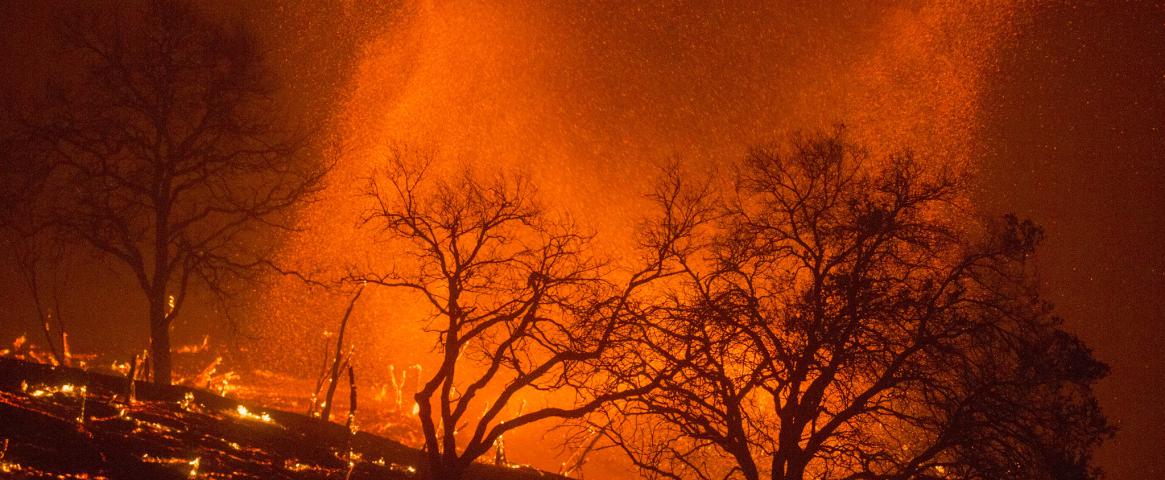By Luis Melecio-Zambrano. Mentored and edited by Simran Sethi.
Last year, over 8,000 fires burned in California, scorching millions of acres, costing billions in damages, and billowing smoke that spread to western Europe. Among the heat and fumes, undocumented farmworkers spent days in the fields saving crops from the flames. At times, the smoke was so thick it turned their saliva black, according to Michael Méndez, a professor of environmental justice at the University of California Irvine. The most intense stretch of wildfires often coincides with the harvest of summer crops and is getting even more calamitous. Climate researchers expect wildfires to grow more frequent and severe, with the number of extreme fires expected to increase 50 percent by the end of the century.
As wildfires worsen, the people who bear disproportionate health and economic risk from exposure to the blazes are undocumented immigrants. At the 2022 meeting of the American Association for the Advancement of Science, Méndez and other researchers called for a more equitable approach to disaster relief that draws on community partnerships to provide crucial services to those who lack them, often due to their undocumented status.
One core challenge is inaccessibility due to language. Many critical public health and emergency advisories are only available in English, but immigrant communities in California largely speak Spanish or indigenous Mexican languages such as Mixtec. During the 2017 Thomas fire, Ventura County used Google Translate to share emergency information in Spanish throughout the first days of the crisis, resulting in grievous mistakes, including translating “wildfire” into the Spanish word for “hairbrush.” Issues with translation can also confuse mandatory evacuation orders, a tool crucial to moving residents to safety.
Even when evacuation orders are understood, people may lack the access to transportation and money needed to secure shelter. Many undocumented laborers stay in evacuation zones because they cannot afford to lose work, even if that means working in the shadow of a wildfire.
“Farmworkers are allowed to enter into mandatory evacuation zones … to harvest the wine grapes and protect them from … wine taint – when smoke and ash enters the membrane or the skin of the grapes,” explained Méndez. “But nobody is really concerned with … how that’s tainting the lungs of these migrant workers.”
Despite exposure to dangerous conditions, workers are not given hazard pay, frequently lack health insurance, and often work in fields with unenforced occupational health and safety standards. For example, when the California Occupational Safety & Health Board adopted an emergency regulation requiring employers supply N95 masks for farmworkers in areas affected by wildfire smoke, a poll by United Farm Workers showed that over 80 percent of workers in California’s Central Valley did not receive the high-quality masks.
As a result, community aid groups and local governments stepped in to ensure workers’ safety. According to Genevieve Flores-Haro, associate director of The Mixteco/Indígena Community Organizing Project, or MICOP, aid organizations distributed around 15,000 masks directly to workers, the bulk of which were donated by the local public health department.
These kinds of collaborations are one key step to a more just disaster response. “Those interventions and solutions that come from communities … are likely to be a better fit for what we can do to help people,” says Gabrielle Wong-Parodi, a professor at Stanford University studying the effects of wildfire smoke and power shut-offs.
Through the continued advocacy of groups like MICOP, local and state governments are starting to address the needs of their undocumented communities. Ventura county, which had used Google Translate during the Thomas fire, now has a bilingual public information officer. In 2020, California partnered with local aid groups and philanthropies to allocate $125 million in disaster aid specifically for undocumented workers.
Federal laws, however, still largely exclude undocumented immigrants from funds, barring them from disaster aid from FEMA and federal unemployment assistance. In the rare cases that they are available, fear of deportation often stops undocumented individuals from seeking federal services.
Given this broader context, both researchers and community advocates say that deeper, systemic change is needed to ensure workers are protected regardless of documentation status. “Before the wildfire season, these inequities … have always existed: the crisis is just exacerbated,” says Flores-Haro. “...But we’re marching on.”
Luis Melecio-Zambrano is a graduate researcher in chemistry at Cornell University. Luis edits and produces podcasts as part of Science Blender. Find them on twitter @Zambranomelecio or email them at luismeleciozambrano@gmail.com.
Photo: Undocumented immigrants were exposed to some of the worst effects of the 2017 Thomas fire. Kari Greer/US Forest Service




